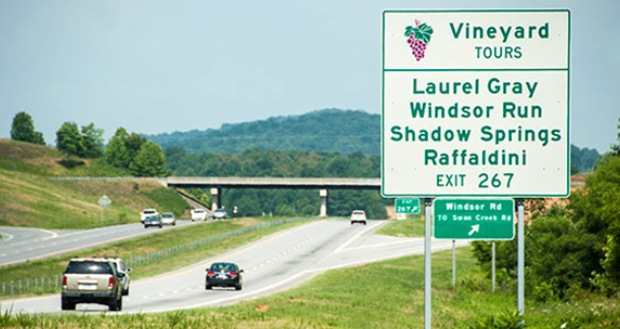A state-run road signage program has played a key role in connecting tourists with North Carolina’s booming wine and grape industry, which supports nearly 8,000 jobs and creates an annual economic impact of $1.71 billion. While there are some concerns about the program, most stakeholders involved in the N.C. Agricultural Tourism Directional Signage Program (NCATDSP) believe the program is unique and effective for participant wineries, leads to increased visits and is vital for the growth of the industry, according to a new UNCG study.
However, the program could be more efficient, and recommendations for making that happen are included in the new study by a team at the UNCG Bryan School of Business and Economics.
The UNCG research team reviewed 21 different road sign programs in 10 states as part of its study of the NCATDSP, which was created by the N.C. General Assembly in 1999 to make it easier for tourists to find wineries and related businesses. The N.C. Wine and Grape Council and the N.C. Department of Agriculture and Consumer Services funded the report.
Among the report’s main recommendations:
- Currently, the signage program is jointly co-administered by the N.C. Department of Agriculture and Consumer Services (NCDA&CS) and the N.C. Department of Transportation. Coordination between the two agencies should be improved to avoid confusion for wineries applying to post a sign.
- The terms “winery” and “wine” are currently not allowed to be used on signs in the N.C. Agricultural Tourism Directional Signage Program even if “winery” is part of a business’ full name. Many other states, including California, New York and Virginia, permit the terms to be used on signs. North Carolina should look into allowing these terms to be used in the NCATDSP to help with overall branding of the industry.
- Wineries pay the full cost of building and posting road signs, with such signs in North Carolina among the most expensive in the 10 states that were studied. Fees for interstate signs range from $25,000 to $50,000 and must be paid in full up front, which is challenging for smaller wineries. Staggered payment programs, industry-backed subsidies and insurance programs for repairing or replacing damaged signs should be explored.
UNCG Bryan School professor Joy Bhadury, associate professor Erick Byrd and executive in residence Samuel Troy authored the report, which is the latest of several that UNCG research teams have done over the past several years about various aspects of the state’s wine and grape industry.
Reposted from Campus Weekly
